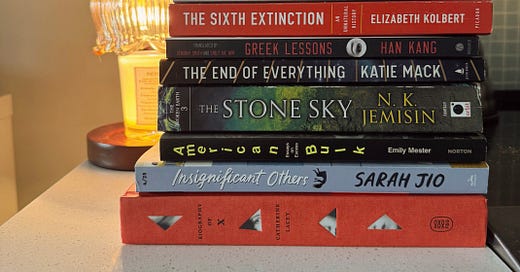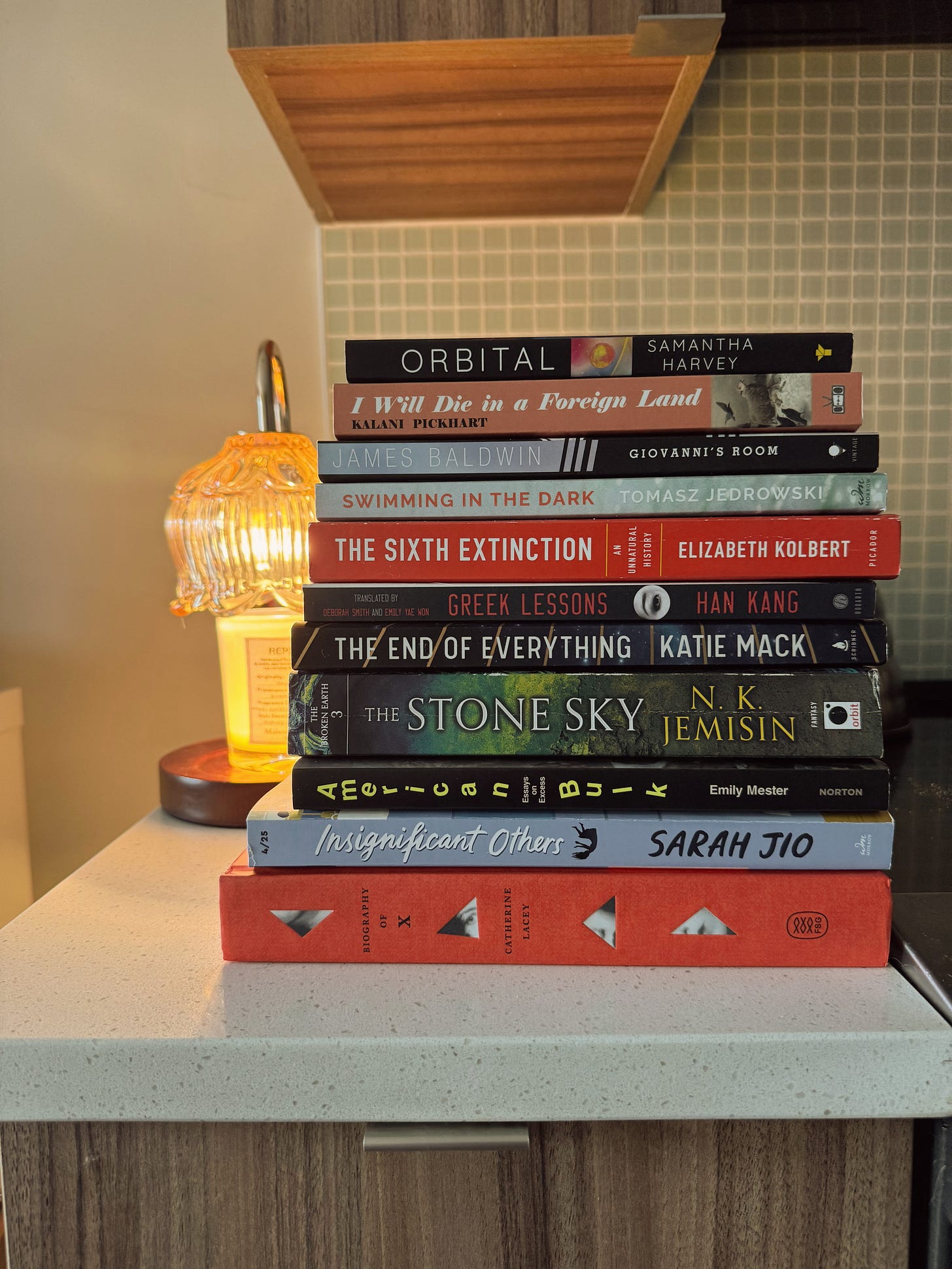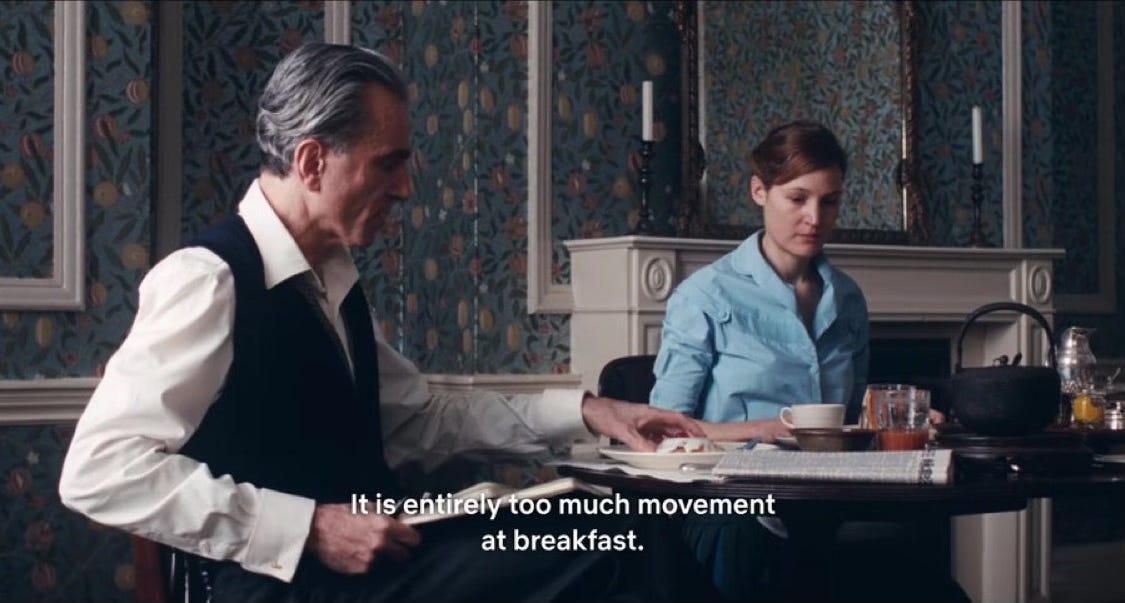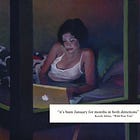This month’s Consumption Diaries is a long one. I, at some point in the first half of March, decided that a monthly roundup for February simply would not and could not happen. I’ve been quite busy both in my personal life and at work, and, as you are aware, the world is falling apart. I’ve included February here anyway because god forbid I do anything without proof that I’ve done it.
A theme in my reading these past couple of months has been “existential crisis in regards to the entire existence of humanity,” which is often bleak but sometimes very comforting. There is some peace to be found in the understanding that we are small and insignificant, and accepting that allows us to find a life that feels big and significant to us.
I Will Die in a Foreign Land by Kalani Pickhart
To grossly simplify things, in 2013, the Ukrainian revolution began in response to the president’s decision to align the country closer to Russia than the EU. After protests turned violent, instigated by the police, hundreds died. In 2014, Russia annexed Crimea, and as we all know, the Russia-Ukraine war has still not ended today. I Will Die in a Foreign Land takes place during the revolution, following characters that remind us of the human cost of war and conflict. This book ended up getting a rare spot on my Instagram grid. My reflection was a self-centered one, which is my M.O., but I’ll include it here:
I am a quarter Ukrainian, though it isn’t a country I feel I can rightfully call mine; any related identity I claim is self-imposed beyond the few foods that were passed down to my father, his memories. As so many immigrant stories go, the language and culture were purposely lost in exchange for the hope of assimilation, our family name morphed into something vaguely Eastern European or Russian.
In 2014, during the events that led to the annexation of Crimea and the current Russia-Ukraine war, and then again after Russia invaded Ukraine in 2022, I thought about all of the forever-unknown-to-me family members displaced or killed. But still: not my personal tragedy to claim. Of course, the geopolitical doesn’t need to be personal to spark outrage and devastation, nor should it. We all grieve for Ukraine, for Palestine, for Sudan, for the millions more.
As I was reading this book, Ukrainian President Zelenskyy met with Trump, resulting in a sickening, childish display of US power and incompetence. Zelenskyy was the first world leader to be kicked out of the Oval Office. Much of the world — my own country included — made its stance on oppression clear. If we aren’t going to support Ukraine, we will abandon everyone else as well.
The grief swells, regardless. Families lose their homes, their members, their means to survive. Though I Will Die in a Foreign Land is specific to Ukraine, it’s impossible not to think about how history has repeated itself a thousand times over, will continue to repeat itself a thousand times more.
Kalani Pickhart captures the essence of this so well through quietly woven stories — the complicated feeling of diasporic Ukrainians, the aid workers, the journalists seeking to provide even coverage, the ordinary citizens who feel they have no choice but to fight back in whatever ways they can.
This book will stay with me for a long time, coming up to the surface when world leaders reveal their ugliness and humanity reveals its resilience in the face of that. May we all meet the end of our lives in a land that feels like home.
And one last small thing I appreciated: These characters are connected in several surprising ways, some of which would feel improbable in real life, but the author makes their threads feel deliberate rather than a gimmick. I find that to be an impressive feat — most books that deploy the invisible thread tactic make it feel like the whole point was simply to surprise you, and it often cheapens the whole story. Pickhart writes as if these characters chose themselves.
Greek Lessons by Han Kang
To me, this was ultimately a book about the power of language, or at least a deep appreciation for it. A teacher and a student, one grieving the loss of his sight and the other her speech after a failed custody battle, are brought together through an Ancient Greek class. Both struggle to find a sense of self in the face of their loss, and as a reader, I felt like both characters were incomplete — almost purposefully, as if they were meant to be shells. But that doesn’t mean we don’t get a depiction of their inner and outer lives or an explanation for how they’ve arrived in this Greek class, holding onto their own versions of reality.
I’ve struggled to discuss this book, so instead, I’m relying on the experts to find the right words. I appreciated this New York Times review. I did like the book — though it wasn’t my favorite Kang — but sometimes there are books we don’t really have much to say about, and that silence isn’t a judgment call.
I bought it at an airport to keep me company during a nine-hour delay, and it being not quite a page-turner made it difficult to focus in such a distracting environment. I stopped reading regularly to think about both humanity and my senses (what a privilege to have them). I’m also excited to read Han Kang’s newest novel. Once I do that and The White Book, I will have completed my Hang Kang ouvre quest!
Biography of X by Catherine Lacey
I had the privilege of reading this with the brilliant
, even though you will not be surprised to hear I read it at a glacial pace compared to her.You can’t get much more creative and thorough at the same time than Catherine Lacey with Biography of X. It’s meant to be a book within a book, where the author is actually a woman called CM Lucca, who is writing a biography of her wife, the mysterious X, after her death. As CM begins her research, which she only begins to spite another biographer whom she feels wrote an incomplete and sloppy biography of her wife, she unearths more than she anticipates, particularly about X’s ability to reinvent herself. Her discoveries ask us the age-old question: Can you ever really know another person?
While much of CM’s biography reflects on her relationship with the woman whom she deified and submitted to, she also delves into the fictional Southern Territory, which comprises nearly the entire South after it seceded post-WWII and fell into an impenetrable, fascist state ruled by fervent religion. It’s quite the concept, and though it was unbelievable in some ways1, I would have read an entire fake nonfiction book about the Southern Territory.
Lacey is so thorough in constructing her “research” — sprinkled with some historical accuracies, real people, believable footnotes and a bibliography — that the alternate history of the US is almost necessary to remind you that this book is, in fact, not real.
pointed out that it felt like Lacey’s novel Pew could have existed within the same universe, with the Southern Territory looming large, and that’s a delightful train of thought.As the book progressed, I found myself caring less and less about X or her wife. X would have been an insufferable person to know. The book doesn’t require that you care for her or even grow invested in her story, but the way that X holds a mirror up to the entirety of humanity’s underbelly makes the novel really shine for me. She is insufferable because we all are. Her shifting identities feel dubious because, if we’re honest with ourselves, our own identities are hardly more solid, and the simple act of a loved one interrogating them could cause the whole thing to topple.
I really liked this book! Some information to do what you will with: Lucy Dacus, everyone’s Goodreads bestie, gave this five stars.
American Bulk: Essays on Excess by Emily Mester
Honestly, I wanted a bit more from this, but I recognize that's reflective of my own expectations rather than the book itself; I went in expecting the essays to be more cultural critique than personal essay. And the more I sit with it post-reading, the more I’m saying, you know what, hell ya.
Mester finds connections between her personal life and all of our personal lives, and this mostly worked. Sometimes, the essays felt a bit disjointed or out of place, and at other times, the theme felt lost. The author details her specific background in depth, and while it isn't an out-of-the-ordinary one, on occasion, I thought, "Well, that's your experience" before I caught myself and let it be. And that’s the charm and downfall of any essay collection!
Even still, Mester refrains from projecting and doesn't try to convince readers that her experience is universal, nor does she attempt to hide her privilege. Instead, she lets it seep through and inform her opinions, which are brutally honest about the people and circumstances in her life that have both given her the privilege of being a consumer and skewed her perception of consumption altogether.
There's nothing wrong with the format, and I think personal essays also lend a fresh perspective to a subject we’re all used to reading about in a more journalistic presentation2. I most appreciated the gentle nudge toward examining my own consumerism, which isn't a new concept for me but one I often avoid confronting because it's emotional and embarrassing. Buying things is a comfort to me, and the author gives readers permission to confront that with compassion.
Insignificant Others by Sarah Jio
Am I wading back into the romance pool? I can’t say for certain (minus a plunge once the new Emily Henry comes out), but Insignificant Others was me dipping a toe back in. It’s about a woman stuck in a Groundhog Day-esque loop where each morning, she wakes up married to a different man from her past, giving her a glimpse into what could have been. Because there are so many of these men, there are, mercifully, not 400 pages of miscommunication and unwitty banter and will-they-won’t-they-we-know-they-will. There are no cringe sex scenes because there are no sex scenes at all. I’m not sure how this would sit with avid romance readers, but that’s exactly what I need!
It’s kind of a bummer to think of every single one of my sliding door moments ending in marriage, like there is no possible defining thing about me besides the people I’ve dated or flirted with. And I would have appreciated the protagonist defining herself outside of her relationships with men and her shallow self-image as well. Honestly, I’m not sure I liked the protagonist! But I read this fast, so that has to count for something.
Thank you to the publisher for the ARC! This one comes out in April.
The End of Everything (Astrophysically Speaking) by Katie Mack
I’m pretty certain no one who reads this newsletter also counts “pretending to understand pop science astrophysics” as a hobby, so I’ll keep this one brief. But just know, if you do ever want to dabble, I’ll welcome you with open arms. The End of Everything examines several scenarios in which the universe — and literally, the entire universe, not just our tiny corner of it — could cease to exist. There’s some science and math, of course, but I found it quite accessible, with an approachable tone and a good filter for what not-smart people like myself will and will not understand.
and, February’s reads, trying to keep it shorter than usual:
Counterattacks at Thirty by Won-pyung Sohn
I read an ARC of this thanks to NetGalley and the publisher, so you can read my Goodreads review here. Overall, I enjoyed it, and it made me think about expectations for aging under capitalism.
Swimming in the Dark by Tomasz Jedrowksi + Giovanni’s Room by James Baldwin
These are getting mentioned together because I intentionally read them back-to-back. Giovanni’s Room informs much of Swimming in the Dark, not just in content — two young men, in love, spend an ill-fated summer together — but also in reference material. The two men in Swimming in the Dark read Giovanni’s Room, think about it, talk about it often. I wanted to experience both while the other was still fresh in my memory.
Giovanni’s Room is a classic for a reason, and I loved it. It’s such a sad book, and idk why I keep seeing it on “summer in Europe vibes😍” recommendation lists because, babe, what is the vibe you’re going for? Because of the parallels, Swimming in the Dark is depressing as well, but I guess if your European summer vibes are about repressive Soviet policies and doomed gay love, step right up!
The Stone Sky by N.K. Jemisin
I’m so sad to have finished this trilogy! I started out intimidated by The Fifth Season, but by the end, I was fully hooked. It’s also been ages since I read a true series like this because I’ve been on my lit fic high horse for years, but these three books are making me want to throw the saddle off (horse girls, please find me a better metaphor).
It’s just a really creative and immersive world, and I love that it separates itself from other future-dystopia literature by being so far into the future that there are few parallels to current humans — at least, physically. There are plenty of parallels for our stupidity, selfishness, destructiveness, etc., toward the earth and toward each other. All of these themes tie together nicely in The Stone Sky, and I’ve been thinking so, so much about the far future, the end of humans, and what comes after.
The Sixth Extinction: An Unnatural History by Elizabeth Kolbert
And clearly, I was thinking realistically about the future of the planet and humans’ extinction! I think we should all be reading more pop science in general; it’s an accessible way of expanding our knowledge about living in the world so that we can do so more consciously. It can all feel a little heavy at times, but the beauty of books like The Sixth Extinction is that they always hold onto a little optimism, and if not optimism, a wonder and appreciation for the world and science.
Though honestly, if I have any takeaways from this particular book, it is that it’s time for the humans to go. Our time on this planet was always finite, but we’ve literally set off a mass extinction from the very beginning of our existence and we won’t stop until we’ve become victims of our own design.
Orbital by Samantha Harvey
I fucking love space, which means I had no choice but to like this book. I get why there were a lot of negative reviews, and I also get why it won the Booker. Unfortunately for marketing teams everywhere, Orbital has absolutely no plot, and most readers will expect one out of an award winner. Like most books that are deemed excellent but don’t do as well commercially, most disappointment from readers is due to failed expectations, in my humble opinion. This isn’t necessarily on readers themselves, but for Orbital, it’s best if you go in without any expectations at all. Though you really can expect some beautiful prose and a deep, deep appreciation for how amazing it is that all of this exists and we exist with it.
I agree that it wouldn’t have killed the author to give us a little plot, and had this been any longer I would have hated it — by the end, as the astronauts orbited over various swaths of land, it began to feel like a song in which the rapper starts out naming a few places and then feels the need to shout out all 50 states and 10 international cities. We couldn’t leave any inch of the planet untouched!
You can see my real-time reading by following me on Goodreads or StoryGraph, both of which I update regularly despite knowing I need to kick one to the curb because this is getting ridiculous.
movies
I’m still trying to get my money’s worth out of a Criterion Channel subscription and my monthly pass at the movie theater. You can watch me transform into a film bro before your very eyes by following me on Letterboxd.
The two best movies I saw in March were I’m Still Here (2024) — tense, heartbreaking, haunting, devastating, compassionate — and No Other Land (2024) — incredibly important, even more so once you take in the staggering fact that an Oscar winner was just kidnapped and brutalized for the exact thing that won an Oscar, and much of Hollywood has stayed silent.
Burning (2018), based on a Murakami short story, was a close third, bumped up into that position because I love a movie that requires me to think about it for hours before I can gather any coherent thoughts. Still working on the coherence, but I will say that it is visually satisfying (I love a fog shot?) and all three actors delivered impressive performances.
Mickey 17 (2025) was highly entertaining, though I wouldn’t expect anything less from Bong Joon-ho. I didn’t love Mark Ruffalo’s little space-Trump performance. I was informed that he probably didn’t know Trump would be reelected when that choice was made, but still, it was stale, unnecessary, and distracting.
Working through the long, long backlist of movies I should have seen already, I was delighted that Phantom Thread (2017) was as good as promised and Blue Velvet (1986) was as weird as promised. Both are movies about little freaks, of very different flavors.
Down With Love (2003) was committed to its bit and I felt like someone could have broken into song at any moment, but it was so witty and silly in the best way. I also saw Black Bag (2025), an entertaining battle cry for monogamy, and Space Cadet (2024), an Emma Roberts movie in which she is a Florida Woman who cons her way into the NASA astronaut training program, and that’s really all that’s worth saying about it.
And, briefly, in February, I watched Moonstruck (1987), The Swimming Pool or La Piscine (1969), Companion (2025), Parasite (2019), and To Live and Die in L.A. (1985). Parasite was a rewatch — god, what a great movie. The Swimming Pool was so aesthetically pleasing and tense that I forgot I don’t speak French, and Moonstruck is a classic for a reason. Plus, I love that a fun movie won an Oscar.3 Companion somewhat ate its own tail, but I love Ex Machina and I love M3gan, so I had no choice but to at least be entertained by it.
shows
I’m watching White Lotus, of course, as a good North Carolinian. On the K-drama front, I loved My Dearest Nemesis, which wrapped up in March, and I’m in the middle of The Potato Lab. I’ve started the tear-jerker When Life Gives You Tangerines, and even two episodes in, I am willing to say publicly that this show is very, very good.
bought
In March and February, I bought a few books — not proportional to the slow speed at which I read. On The Calculation of Volume I and also II by Solvej Balle, Chilean Poet by Alejandro Zamba, Frankenstein in Baghdad by Ahmed Saadawi, Not a River by Selva Amada, Others Were Emeralds by Lang Leav, Independent People by Halldór Laxness, I Who Have Never Known Men by Jacqueline Harpman, The Disaster Tourist by Yun Ko-eun, A Small Place by Jamaica Kincaid, and Gilead by Marilynne Robinson.
Phew. Let me know which ones I should prioritize! I think On The Calculation of Volume I and I Who Have Never Known Men will be strong contenders.
icymi: I wrote a little guest post over at
in February, giving you recommendations in one of my favorite genres, Bad Mom Lit:and my last post, January’s Consumption Diaries:
Like The Southern Territory’s upstairs counterpart, the Northern Territory, going full socialist and progressive in the 1950s, like it still isn’t the US, or women and Black southerners so readily giving up their rights … sure.
And if you have recommendations on well-researched nonfiction that covers consumerism, excess, etc., please send them my way!
This year, I was a little flabbergasted that Anora, a movie I enjoyed but didn’t think was a masterpiece, won Best Picture, but maybe we’re just moving back into the time of fun movies being real movies!








Of your list I have read Orbital, Greek Lessons and Giovanni's Room. Agree that Orbital has no plot or deep characterisation but the description and contemplation on the state of our world was good. Really liked Greek Lessons once I got into it, a very slow detached pace in the plotting though. I do love Baldwin and read this work before I went to Paris last year. It is a bleak book, but illuminating as it is of its time. Such a sensitive writer.
I loved this roundup! will be on the lookout for I Will Die in a Foreign Land (also what a title??!), and I appreciated what you said about Orbital -- I don't have a particular appreciation for space and found the narrative tedious at times, but agreed that the weight of my expectations was heavy!